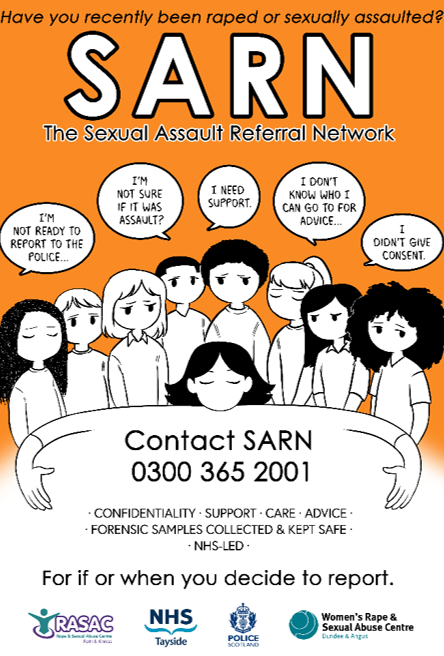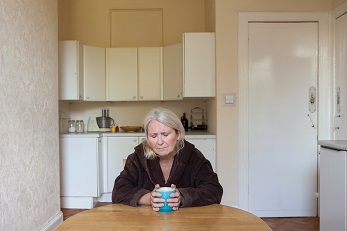If you or your children are in immediate danger and need help, call 999.
- Domestic Abuse
-
If you're experiencing domestic abuse (or have witnessed it) and are worried about your safety or the safety of a child, you can report it by:
Calling 999 or 101, contacting your local police station or visiting a remote reporting site filling in a Police Scotland online domestic abuse form.What happens after reporting domestic abuse:
The police will help and protect you when you report domestic abuse. This includes:
Putting you in touch with a specially-trained domestic abuse officer and with support agencies helping you feel safe – by taking you to a safe place like a refuge, or taking steps to make your own home secure and getting you medical treatment if you're injured.
For more information see link
Alternatively you can contact:
Dundee Women’s Aid - Support Line: 01382 207099
Mon, Tues, Wed, Fri, 9:30am - 12:30pm & 1:30pm - 4:30pm
Thurs 9:30am - 12:30pm24 hour Scottish Domestic Abuse/Forced Marriage Helpline - 0800 0271234
See link for more information
This website from England gives good advice about making a safety plan (just make sure you use the Scottish helpline numbers above
- Sexual Violence
-
If possible, have any injuries treated by your doctor or at a hospital.
If there is a possibility of pregnancy you may want to take the morning after pill (up to 72 hours after) or have a coil fitted (up to 5 days after). To do this, go to your Family Planning Clinic or GP.
You can visit the Tayside Sexual & Reproductive Health Service at Ninewells Hospital (01382 425542) and Angus Sexual & Reproductive Health Clinic (01382 425 542) offers fully confidential treatment. You do not need a letter from your doctor. You need to return for the results. You do not have to tell them you have been raped. You don’t have to give the clinic your real name and you could ask a friend or support worker from the Centre to go with you for support.
If you want to report what has happened contact the Police. If you require a forensic examination, this will be organised for you at the specialist centre, otherwise you will be taken to your local police station where your statement would be taken. You may want to take a trusted friend, family member or partner with you.
If you do not report the incident you could be supported to access the Sexual Assault Referral Network (SARN).
The Sexual Assault Referral Network (SARN) in Tayside has extended its opening hours to support people who have been raped or sexually assaulted.
The SARN offers a self-referral service to people who have been raped or sexually assaulted but do not want to report it to the Police. To provide support, the network has extended its opening hours and has now set up a dedicated phone-line which is available every day until midnight.

The dedicated phone line - 0300 365 2001 - allows people to directly contact a Rape Crisis Helpline worker who will offer initial support and contact to the Forensic and Custody Nurses in Tayside.
Callers are offered support, access to health services, such as emergency contraception and screening for sexually transmitted infections. They are also offered the option of the collection and storage of forensic evidence, should they decide to report to the police at a later time.
This is available to you if you are 16 years old or over and have been raped or sexually assaulted within the last 7 days.
Reporting sexual violence to police can be an overwhelming prospect. Locally, WRASAC can support you through the process and can attend court with you if your case goes to court.
You can report sexual violence that has happened to you at any time in the past. If you are considering speaking to the police you can have support from a support worker from WRASAC.
Please see these useful guides for more information:
- Harmful Practices
-
Forced Marriage Protection Orders were introduced in the Forced Marriage etc. (Protection and Jurisdiction) (Scotland) Act 2011. These aim to protect those being forced to marry, or those already in a forced marriage.
Forcing someone into a marriage became a criminal offence in the Anti-social Behaviour, Crime and Policing Act 2014. Please see links for more information:
FGM
The Prohibition of Female Genital Mutilation (Scotland) Act 2005 (external site) made it a criminal offence to have FGM carried out in Scotland or abroad.
In 2016, the Scottish Government released the national action plan to prevent and eradicate FGM.
The national action plan is supported by multi-agency guidance on responding to FGM (external site) which provides information for health workers and agencies. Please see link for more information
You can contact the 24 hour Scottish Domestic Abuse/Forced Marriage Helpline - 0800 0271234
Shakti Women's Aid helps BME women, children, and young people experiencing, or who have experienced, domestic abuse from a partner, ex-partner, and/ or other members of the household- Dundee: 01382 207 095
Amina Helpline - The Helpline is a listening ear and signposting service for Muslim women across Scotland. We run the Helpline Monday to Friday – 10am – 4pm for any Muslim-identified women, and on Wednesdays from 6pm – 9pm for young Muslims women (ages 16-25). It is free from mobiles and landlines and will not appear on your phone bill. All calls are strictly confidential and non-judgemental; we always deal with clients in a faith and culturally-sensitive manner.
- Stalking
-
If you think you are being stalked or are suffering harassment, please report your concerns to Police Scotland at your local police station, via 101, online or via 999 if it is an emergency.
You can access the online stalking form to report an incident of stalking that has occurred within Scotland.
Practical Safety Advice:
- Report it to the police
- Do not interact with the person stalking you.
- Take a mobile telephone with you when you go out.
- Have your keys ready for when you reach your front door
- Consider fitting a home alarm system or carrying a personal attack alarm
- Make your online life more secure by changing your passwords regularly, heighten your privacy settings and do not share personal information with a stranger.
- Activate a pin or password on your mobile devices
- Turn off GPS and locating tagging on your mobile devices.
- If you become aware that you are being followed, make your way to a public place, commercial premises (such as a retail shop) or your nearest police station.


